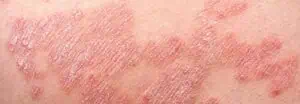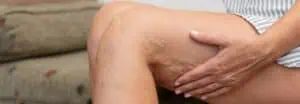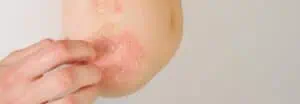DIFFERENT TYPES OF ACNE AND ACNE TREATMENTS
It can be unpleasant to see a patch of pimples appear on your skin. Especially if they are in prominent places like your forehead or cheeks. This can cause not only physical effects but a decrease in confidence and emotional impact.
Unfortunately, there isn’t just one type of acne, nor is acne usually treatable with one solution. The causes of acne will also vary, making acne extremely complicated to manage and treat. Nonetheless, Dermatologists have worked for decades studying acne, breaking down the various types, causes, and continue to improve treatments to reduce acne and compliment your skin in the process.
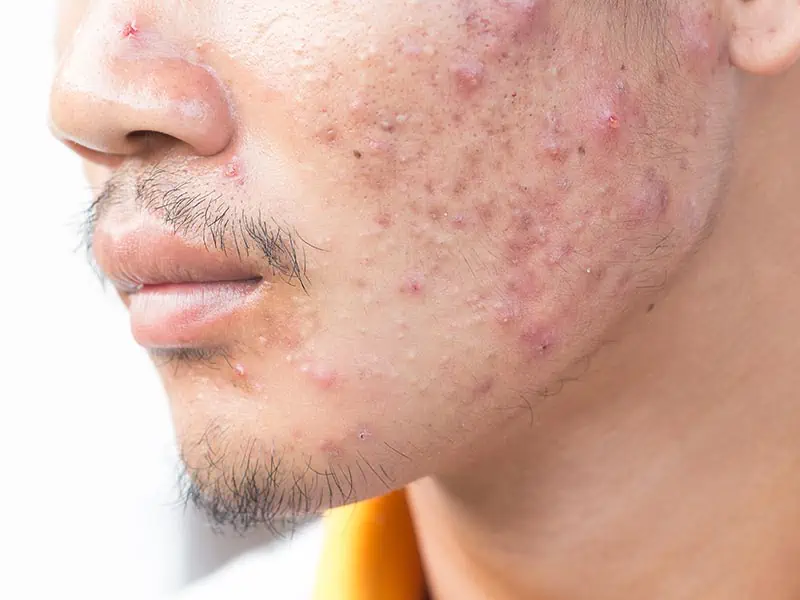
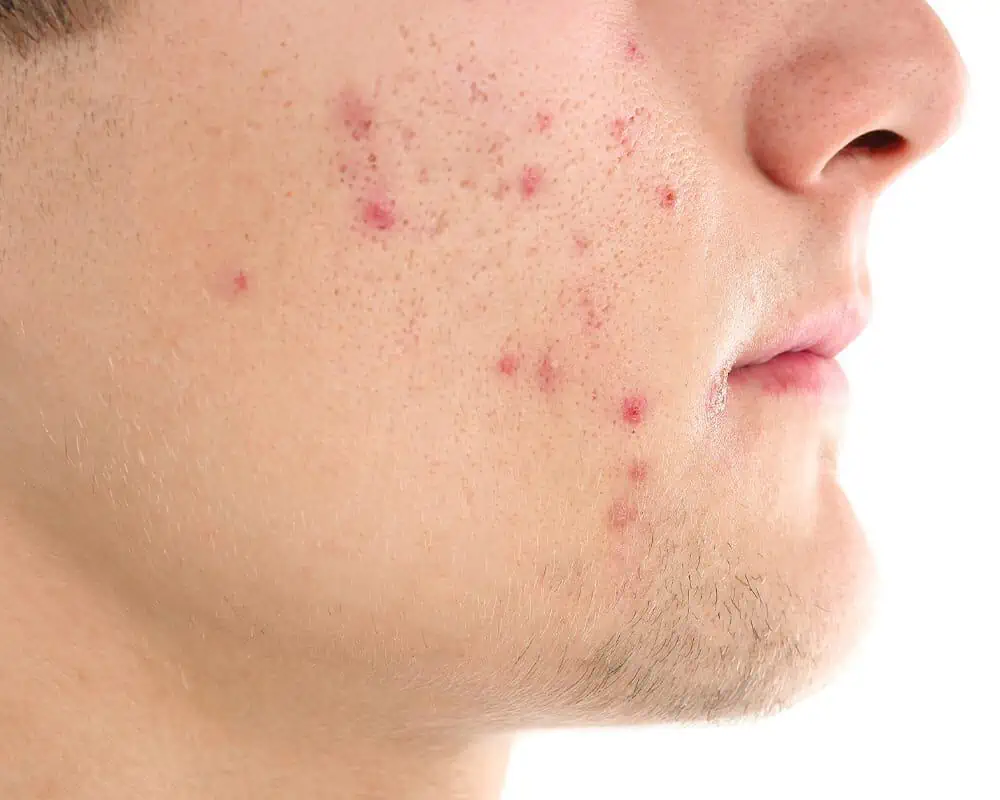
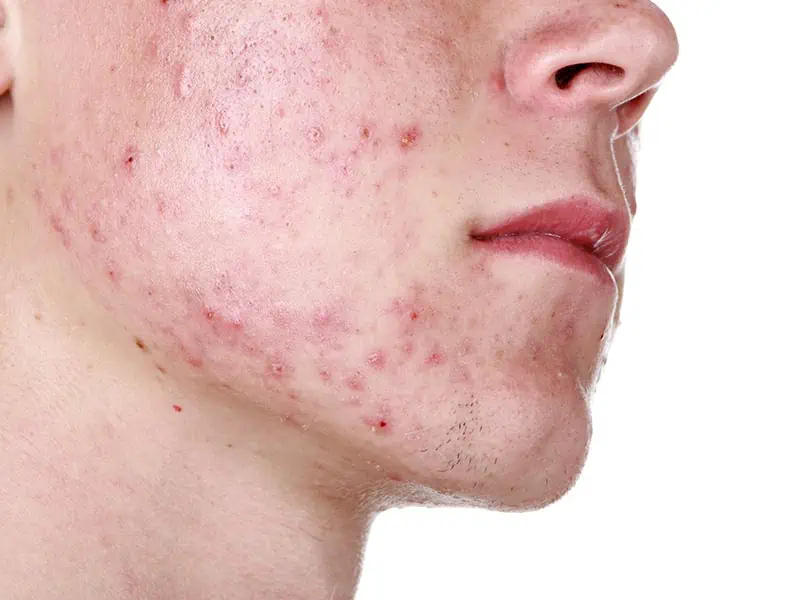
DIFFERENT FORMS OF ACNE
While there are different types of acne, they ultimately fall under three categories. These are:
CYSTIC ACNE
Cystic acne is acne that creates a cyst on the skin that can lead to infection and inflammation as a result of oil build up within your pores, creating a highlight sensitive and a puss-filled spot in the pore.
BACTERIAL ACNE
Bacterial acne is different to cystic acne as this acne is the result of dirt and bacteria on the skin causing acne breakouts on the skin. The bacteria can clog the pores and create pimples and blackheads.
FUNGAL ACNE
Fungal acne is caused by an infection in the hair follicles, typically creating spots on the skin. This causes whiteheads that are easily irritated and inflamed. This acne, unlike bacterial acne, is formed from yeast and or fungus on the skin.
DIFFERENT TYPES OF ACNE AND HOW THEY ARE TREATED
ACNE VULGARIS (COMMON ACNE)
Acne Vulgaris is also known as common acne – this is the most common type of acne that the majority of people suffer from. Typically, 79% to 95% of the adolescent population suffer from this type of acne. Acne Vulgaris is a pimple-based bacterial acne that tends to break out across your face and torso.
Treatment for Acne Vulgaris: The treatment for this type of acne includes over-the-counter topical retinoids and lotions for mild acne vulgaris. Generally, this type of acne tends to be mild, however, more severe forms of acne vulgaris will need treatment programmes from dermatologists that include chemical peels (an acid-based treatment that clears the outer layer of the skin from debris, sebum oil and general bacteria that may clog the pores), microneedling (a skin penetration technique that uses hundreds of needles to gently puncture the outer layers of the skin to induce collagen reproduction on the skin).
COMEDONES
Not referred to as frequently as acne vulgaris, a Comedo is an acne lesion as a result of a hair follicle that has become blocked with sebum oil and dead skin. This type of acne develops into pimples, both whiteheads and blackheads. As the hair follicle becomes blocked with oil, the skin becomes inflamed causing a red bump on the skin.
Treatment for Comedones: Comedones are typically treated with a course of medical acne treatments. These types of acne comedones treatments will depend on your skin health and will require an acne dermatologist to first review your skin before recommending the required acne treatment. These will range from retinoids and lotions that include Benzoyl peroxide, Adapelene, or Salicylic acid. Many dermatologists refer to medications such as Differin, which includes Adapalene.
PUSTULES
Pustules are a type of acne that results in a very sore and inflamed pimple on the skin. The whitehead is surrounded by redness and inflammation and raised skin. This is sensitive to the touch. The pimple is full of oil that resembles a poppable pimple. It’s very easy to want to pop these to relieve pain and tightness on the inflamed area, however, this will cause acne scarring and potentially spread the acne across the skin.
Treatment for Pustules: Pustules can be treated at home as well as through a dermatologist. At home, a skin cleansing routine using warm water and mild face cleansers that do not include ingredients that could irritate the pustule. It is also imperative that your fingers are clean so that no extra dirt is being rubbed onto the pustule. Medically, topical treatments that include Benzoyl and salicylic acids can help to reduce both the inflammation and swelling on the skin.
NODULES
Nodules are extremely sensitive inflamed bumps on the skin caused by dead skin and bacteria clogging your pores. They develop under the outer layers of the skin, in the deeper layers. Unfortunately, these require professional help from a dermatologist because they can and often do result in acne scarring.
Treatment for Nodules: Your dermatologist is likely to prescribe medication for this type of acne that removes bacteria from the skin. This will include Benzoyl or salicylic acids. If the acne results in a scar, you are likely to require chemical peels, micro needling or acne laser treatment to help bring the skin profile back to normal and reduce your acne scars.
ACNE CONGLOBATA
This type of acne is one of the most severe forms of acne. The nodular acne has become inflamed under the skin resulting in red blemishes and acne scarring. It’s caused by high testosterone and is seen mainly in men who take steroids.
Treatment for Acne Conglobata: This type of acne will require dermatological support. The acne scarring resulting from the nodular cystic acne will require potentially invasive treatments such as ablative acne lasering. Your dermatologist is also likely to recommend prescription isotretinoin – this is the most effective medical treatment option for Acne Conglobata.
CONSULTING A DERMATOLOGIST ABOUT TREATMENTS AND YOUR SKIN
With acne being so complicated, it’s always best to consult an experienced acne dermatologist. Your dermatologist will be able to analyse your skin, diet and general health to assess the right types of materials for your skin. They will also be able to provide an acne treatment plan that isn’t affected by the materials you wear/sleep in. For more information on acne treatments for your acne or on removing your acne scars, we welcome you to book a consultation with us. Alternatively, please contact us to speak to one of our experts.
